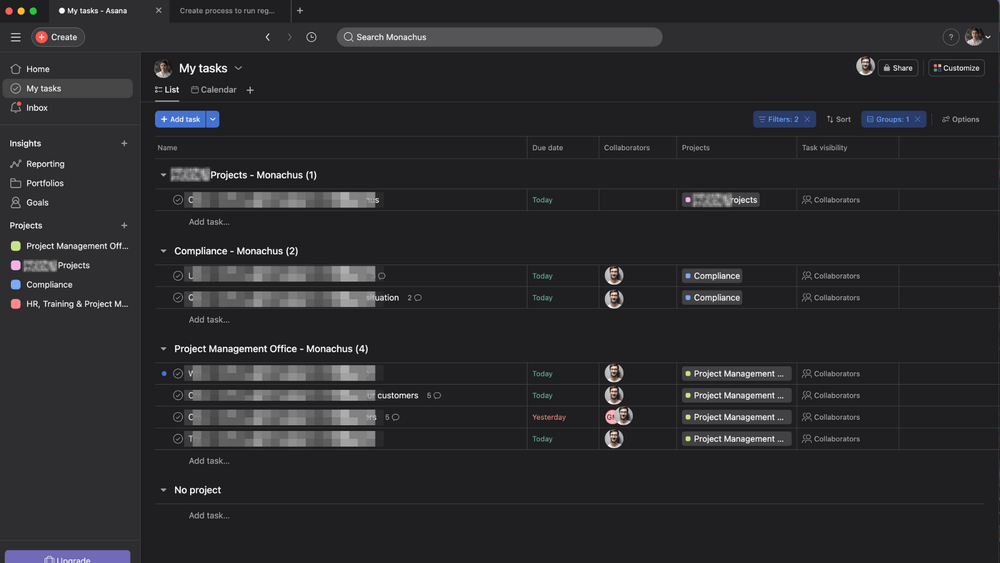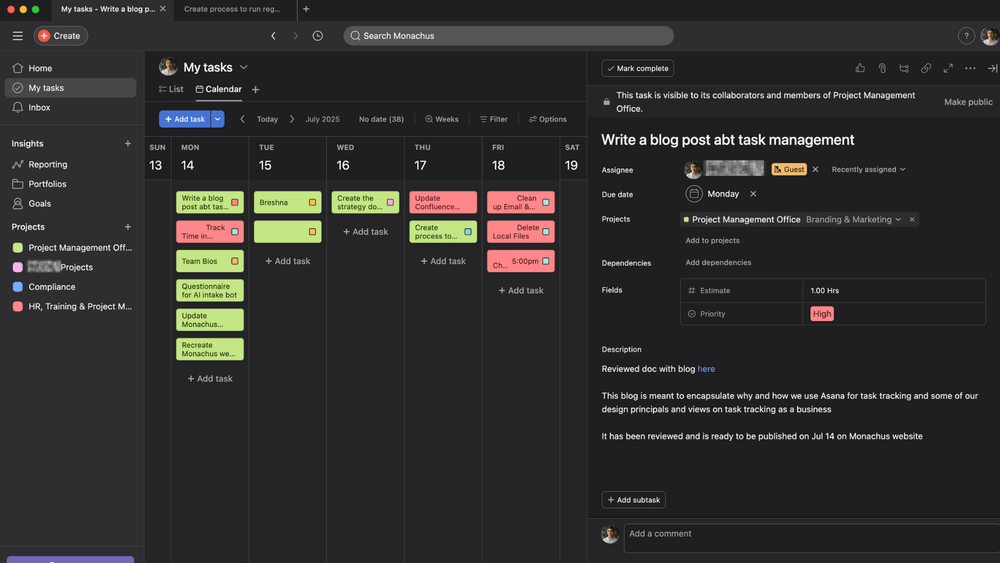Inside Our Workflow: How We Use Asana to Stay on Track

A look into how Monachus builds clarity, accountability, and flow using Asana as our task management tool of choice.
At Monachus Solutions, we operate like many of the startups we support fast-paced, remote-friendly, and constantly balancing competing priorities. Through trial and iteration, we’ve learned that task management isn’t just helpful, it’s the backbone of how we work.
Whether we’re onboarding a new client, running internal projects, or keeping daily operations flowing, we rely on a clear system to track what needs to be done, who’s responsible, and what’s next. That’s where Asana comes in.
This post offers a look inside our workflow: why we chose Asana, how we’ve customized it, and the principles we follow to make sure our team stays aligned, efficient, and accountable.
Why Task Management Matters
Startups and small businesses often delay setting up structured task management, thinking it’s only necessary when the team gets bigger. But in reality, structure creates speed. Without a central system, things get lost, deadlines slip, and ownership becomes unclear.
At Monachus, even in a lean team, clear task management has helped us:
Keep remote teams aligned
Move projects forward with fewer bottlenecks
Break down complex goals into clear, actionable tasks
Create a strong feedback loop between managers and team members
Why We Chose Asana at Monachus
We’ve used tools like Jira, Monday, and Trello each with strengths. But Asana hit the sweet spot for what businesses like ours need: flexibility, clarity, and automation.
Why Asana works for us:
It scales with us: From one-person workflows to company-wide systems.
Custom fields and views: We tailor each board based on team roles or project needs.
Automations that save time: Recurring tasks, reminders, and status updates just happen.
It is lightweight for our use case: JIRA is too clunky. Monday automations are unreliable. Trello doesn’t have enough structure for us.
While we still support clients using Jira (especially for SOC 2 audits) or Monday (based on preference), Monachus runs internally on Asana and we wouldn’t have it any other way.
How We Set Up Asana at Monachus
We structure our workspace to support both flexibility and clarity:
Projects for major workflows like onboarding, operations, and content
Templates for repeatable projects or processes
Client Boards when we manage external work or support implementation
Each team member also maintains personal boards for individual priorities, and we use custom fields like “Priority,” or “Time Estimate,” to add helpful context to tasks.
To keep things efficient, we hide default views that don’t add value, keeping only the perspectives that help each role see what matters most. This clarity helps avoid clutter and saves time.

The Monachus Principles: How We Manage Tasks
Over time, we’ve developed a set of core principles that shape our approach to Asana and task management in general:
No subtasks - This may seem counter intuitive but we have found that this hides work. We keep tasks flat and visible.
Every task must have a due date - Even if we reschedule, nothing gets lost.
Comment before closing - Updates are documented, transparent and have a clear “audit trail”.
Tasks live in the right project - So teams always know where to look.
Link important docs - Either in the description or comments for easy access.
Asana in Action: Results and Improvements
Since building our task management system around Asana, Monachus has seen:
Stronger project momentum – Everyone knows what to do next.
Clearer accountability – Ownership and expectations are always visible.
Improved onboarding – New hires understand our systems faster.
Better traceability – Any task has a history and a reason behind changes.
We don’t treat our Asana setup as static, it evolves with our team. We run regular reviews to clean up boards, improve templates, and respond to feedback.

Conclusion: Structure Drives Growth
At Monachus, we believe that effective task management is essential, especially in a startup setting where speed and alignment are everything. Our task management solution gives us the structure we need to move fast, collaborate confidently, and build systems that grow with us.
Whether you’re just getting started or trying to bring more order to a growing operation, your task system matters more than you think. And if you're not sure where to begin, we’re here to help. We have helped startups build this in JIRA, Notion and Monday.com to just name a few tools.
Need help setting up or refining your task systems?
Monachus offers operational consulting for startups looking to scale. Let’s talk.